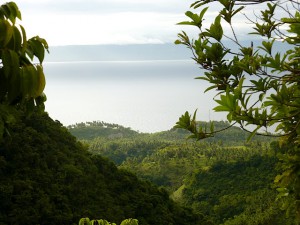
The mountains in Alegria
In March 2016, on a month-long volunteer mission for W4 with our education program in the Philippines, I had the opportunity to make a field visit to Alegria, a small municipality tucked away in the mountains. The local Program Director, Chloe, and I left the office in Cebu City on Friday afternoon and hopped on a bus. This was my first trip outside the city since I’d arrived in the Philippines a few days earlier: my first chance to see a little more of the country. For three and a half hours I sat on the bus, glued to the window, captivated by the stunning mountains, fields of palm trees, and glimpses of dreamlike beaches we passed along the way.
In this far-flung rural region, on the southwestern coast of Cebu Island, families live scattered throughout the area, geographically distant from one another, their homes nestled among the forests of coconut trees. Despite abundant natural resources, including beautiful beaches, lush green mountains, waterfalls, and caves, and notwithstanding the obvious potential for tourism, there is very little industry in Alegria. Poverty is, therefore, prevalent. Most of the population lives off subsistence farming, with very little access to other resources, including cash, to meet their everyday needs. Although we are well into the 21st century, many homes here still lack electricity and running water, and children often have to walk very long distances to attend school each day. Moreover, the isolated nature of the municipality makes Alegria’s poverty less visible than it is in big cities, so few development projects reach these communities. Many families struggle simply to meet their daily needs and have little income left over to pay for mandatory school-related expenses for their children, such as uniforms, shoes, or school projects.
Little girls in our local education program
W4’s field program in the Philippines, Children of Asia, has been working in Alegria for several years, providing educational support for local children, enabling them to attend high school and college. Miss Ana Fe, a young woman in her late twenties, is the social worker in charge of the Alegria program, and she travels to the region several times a month to meet with the students and their parents. On Saturday morning, we got an early start with Miss Ana Fe and made the exhilarating uphill journey on habal-habal (motorbike) to the house of a teacher, Ma’am Recylen, in Madridejos, for the first of that weekend’s meetings.
Ma’am Recylen is a 34-year-old kindergarten teacher. Her kindness and warmth make you feel immediately welcomed and at ease. And her devotion to the children in the program is radiantly obvious. A local and familiar presence, Ma’am Recylen provides guidance and advice to students and their families about any difficulties they may be experiencing — in school, at home, or with their health. She acts as a permanent link between the community in Alegria and the main office in Cebu City. In the evenings and on weekends she also conducts house and school visits to follow up with the youngsters.
Ma’am Recylen cooked us a wonderful breakfast of rice, eggs sunny-side-up, and a sweet Filipino sausage, and I got to try fresh buko juice (coconut water) and to buy some biko (sticky rice with chocolate, wrapped in palm leaves) from one of the mothers before the meeting started.
Since the families in this area live so far apart from one another, meetings have to be held in three different locations: Ma’am Recylen’s house in Madridejos; the Barangay (the local council) Hall in Valencia; and the Health Center in Inghoy. These monthly meetings with the parents give Miss Ana Fe the opportunity to discuss upcoming events, such as the Summer Camp, to distribute vouchers for the students’ school projects, and to provide the parents with significant reminders about the program (the importance of anticipating school-related costs, for example, or of informing the social workers and teachers about health problems). Miss Ana Fe brings a great deal of kindness, compassion, and simplicity to her work. Although I couldn’t understand all the content of the discussions, which were in Cebuano, I got the sense that Miss Ana Fe knew how to make the families feel comfortable and at ease, balancing the need to speak seriously about certain issues while remaining light-hearted and caring.
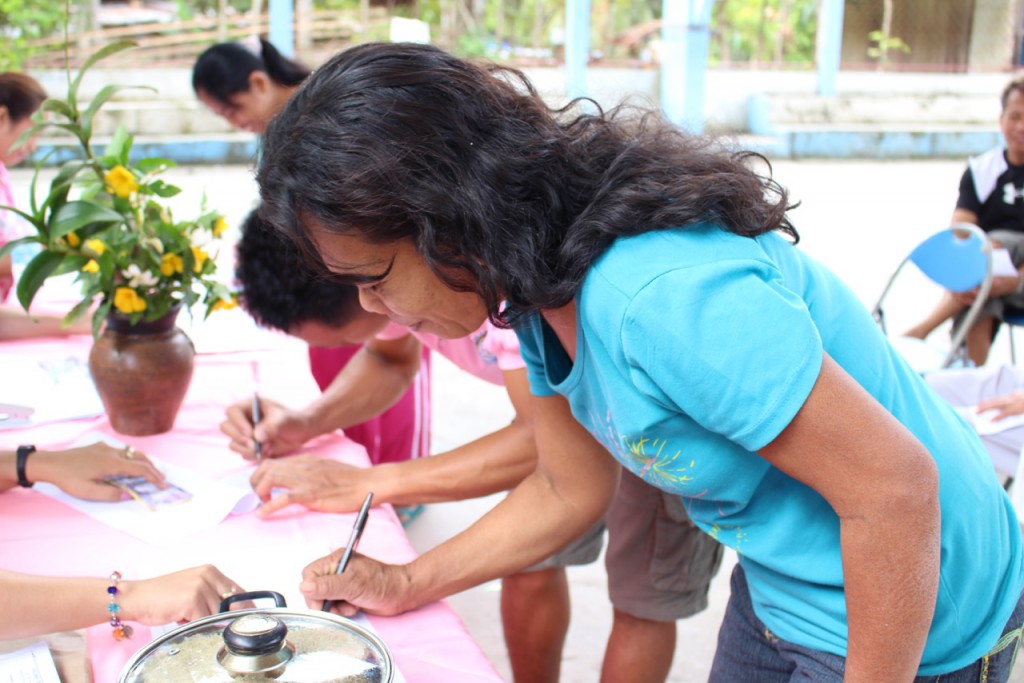
Mothers at a parent-student meeting
These meetings are also occasions to distribute monthly rice allocations to the families of the children — 5 kilos each for high school students; 6 kilos each for college students. Food aid is a crucial part of the educational program in Alegria. Rice (often served at all three meals) is a crucial staple for families in the Philippines, and lack of food is one of the main problems that keep children from attending school in many developing countries. The monthly rice subsidy ensures that children have access to the nutrition they need in order to attend school, concentrate, learn, and succeed in their studies. It also helps to compensate families for the loss of income they sustain when they send their daughters to school rather than sending them out to do paid work or keeping them at home to look after younger siblings while the parents work.
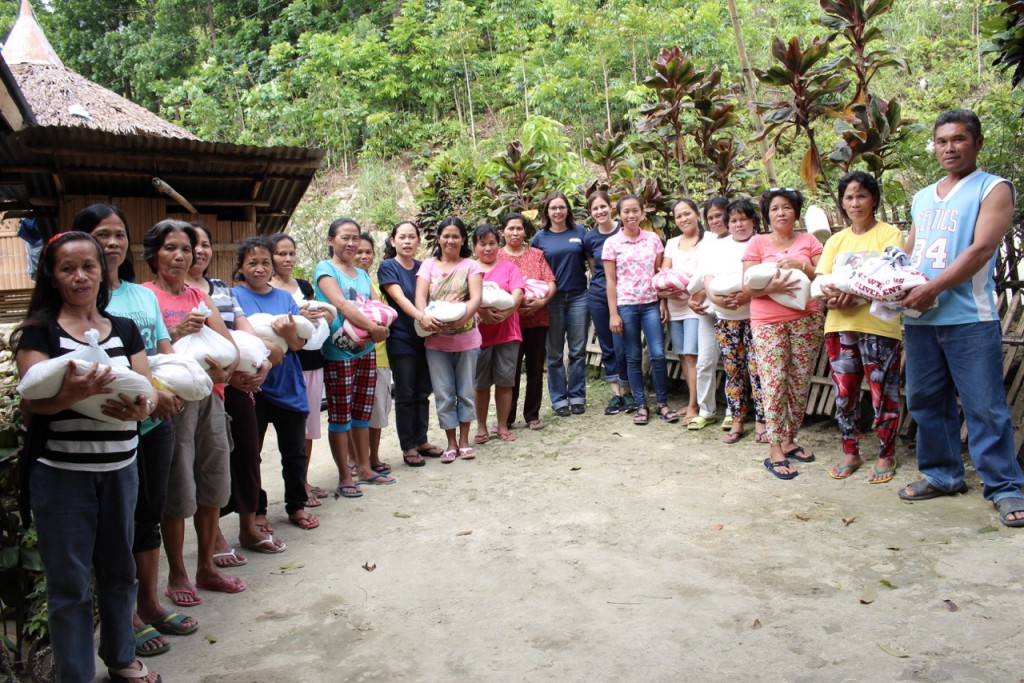
Parents receiving the monthly rice subsidy
At this meeting, we also had a special surprise for some of the parents! A few donors had sent a donation of a dozen “Little Sun” solar-powered lamps, which we were able to distribute to the few families who still lacked electricity in their homes, as well as a couple of the early-bird arrivals at the meeting. The unique and playful nature of the lamps, which are shaped like yellow flowers, sparked a great deal of curiosity among the families, who were delighted with the gifts. We also took this opportunity to interview several of the parents and children, who all spoke about how important going to school was for them and how they hoped it would lead to better futures for themselves and their families.
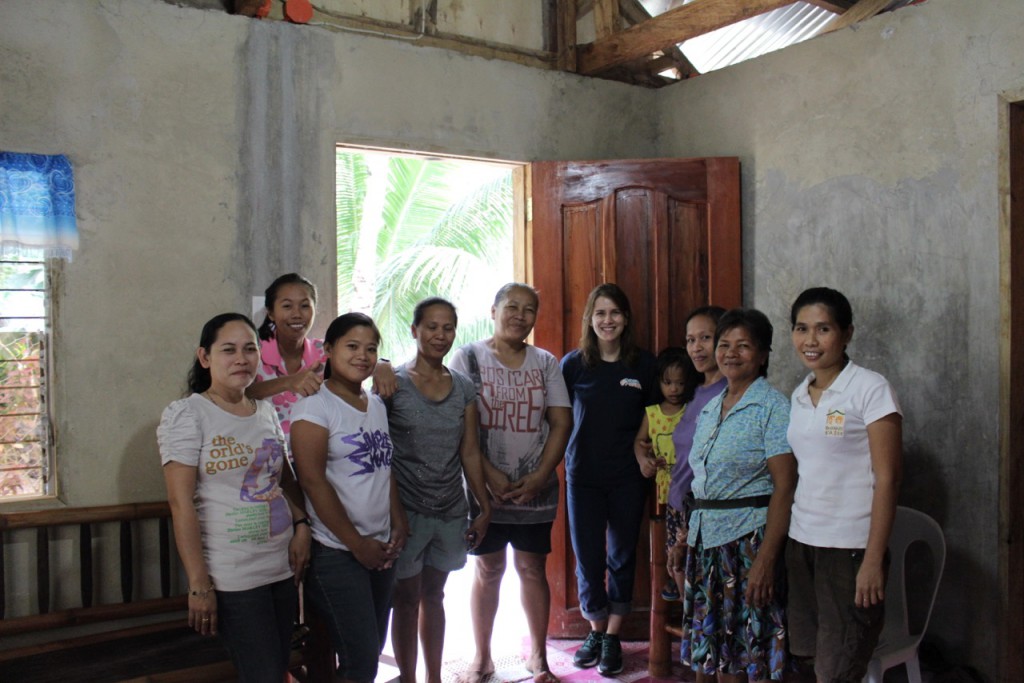
Shawna (center) with local school teachers and social workers
Since my visit was regarded as a “special” occasion, and despite the families’ modest means, after each meeting the families brought us lunch: soup, pork, chicken, rice, barbecued bananas, delicious exotic fruits. Knowing how scarce the families’ resources are, I was extremely touched that they all shared their food and took the time to cook and eat with us.
Since arriving in the Philippines, I have felt incredibly warmly welcomed and have been moved again and again by the kindness and generosity of everyone I’ve met. Alegria is no exception, and I’m very grateful that I had the opportunity to travel to this beautiful, remote region. I loved meeting the children in the education program and their parents. And it was wonderful to discover the local cuisine and to ride the habal-habal up and down the mountain. I was struck by how upbeat, happy, and friendly everyone was, despite the difficult conditions in which they live. All of the meetings took place in a good-humored, relaxed, and positive environment and many of the parents came up to personally thank me for volunteering.
Being here has made me even more proud of my Filipino heritage and I only wish that I spoke Bisaya, so that I could really get to know the people here!









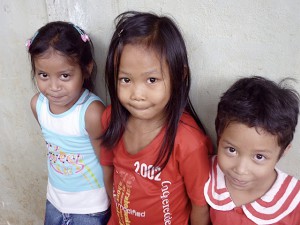





1 Comment
A very beautiful and moving article..